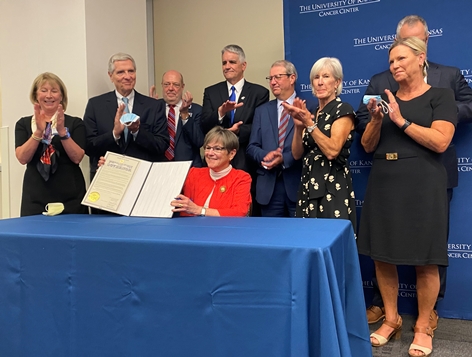U.S. Rep. Sharice Davids, D-3rd Dist., said allowing Medicare to negotiate for lower drug costs will help put money back in residents’ pockets.
Rep. Davids recently held a roundtable discussion on new provisions to lower the cost of prescription drugs in Kansas. Davids also joined Glenda DuBoise, state director of AARP Kansas for a virtual town hall to speak directly to Kansas seniors about these new cost-saving measures.
Americans pay two to three times what citizens of other countries pay for prescription drugs. Thanks to a new federal law, beginning next year several policies will go into effect to help Kansans afford their medications, including a cap on insulin prices for Medicare beneficiaries, rebates if pharmaceutical companies raise prices faster than inflation, and the first-ever out-of-pocket cap on seniors’ medication costs.
“There’s no reason Kansans should pay so much more for medicines than people in other countries, and we’re finally starting to change that,” Rep. Davids said. “Allowing Medicare to negotiate for lower drug costs has been a priority of mine since coming to Congress, and I am so glad we were finally able to get it done. These new provisions will put money back in Kansans’ pockets and reduce the stress of having to choose between life-saving medications and other necessary expenses.”
New, key provisions that will save Kansans’ money on prescription drugs include:
• Capping insulin copays at $35 per month for Medicare beneficiaries. An estimated 28,000 Kansas Medicare beneficiaries used insulin in 2020. Starting next year, their costs will be capped at $35 a month for life-saving insulin.
• Capping seniors’ out-of-pocket costs at $2,000. Starting in 2024, Medicare prescription drug plans must offer improved financial protections and in 2025, a $2,000 out-of-pocket cap will take effect. Each year, that will benefit about 18,000 Kansas Medicare beneficiaries who would otherwise have out-of-pocket costs above the cap—and, for the first time, all 401,000 Kansans with Medicare Part D will have the peace of mind of knowing their pharmacy costs are capped.
• Allowing Medicare to negotiate prices for high-cost drugs. Approximately 5 to 7 million Americans on Medicare will likely see reduced costs on their most expensive medications thanks to Medicare negotiation. Additionally, billions of taxpayer dollars will be saved and put towards reducing the national debt.
• Addressing skyrocketing prescription drug prices. Starting next year, companies will be required to pay Medicare a rebate if they increase prices faster than inflation.
While these savings were included in the Davids-supported Inflation Reduction Act, comprehensive legislation to lower health care and energy costs and reduce the national debt by more than $300 billion, Rep. Davids has been working to lower health care costs since before her election. She led her colleagues on similar actions to lower the price of prescription drugs and co-sponsored legislation to do so. She also released a report on the high price of insulin in the Kansas Third and held a roundtable with local parents to discuss how the rising cost of insulin impacts their family after voting to cap insulin co-pays at $35 a month for all Americans.
- Story from Rep. Davids’ office

